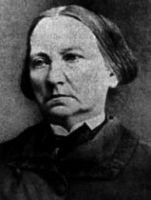Conception Arenal
Fields of activity
Women's rights, law and criminology, public health, social work, philosophy, anthropology and literature.
“The passion for man is a torrent, for women an abyss” (C.A.)
“Open schools and prisons will be closed” (C.A.)
“The society cannot, in justice, prohibit the honoured exercise of its powers to half the humankind” (C.A.)
Biography
Time and space are critical factors in the history of humankind, and the period in which Concepción Arenal lived (1820-1893) did not encourage the development of the female personality. The author of La mujer del porvenir (The woman of the future), La educación de la mujer (The education of women), El estado actual de la mujer en España (The current status of women in Spain), El trabajo de las mujeres (Women's work), La mujer en su casa (Women at home), El servicio doméstico (Domestic service) and many other works of poetry and legal drama, Concepción Arenal had to break many established moulds, overcome a multitude of barriers and face endless criticism from the stale society of the nineteenth century.
By virtue of being female, she encountered social and cultural constraints which were difficult to surmount but which provided the impetus behind her relentless pursuit of truth and her intellectual struggle against the injustice of social and political inequalities of every kind.
Born in Ferrol (Galicia) on January 31st, 1820, her childhood and youth were spent between Armaño (Cantabria) and Madrid, where she studied law and worked for different liberal and Christian newspapers, writing in a style which was ever critical and incisive.
In 1861, the Academy of Moral and Political Sciences awarded her a prize for her report entitled “La beneficencia, la filantropía y la caridad” (Welfare, philanthropy and charity). She was the first woman to receive this award in the history of the emblematic institution, and in 1863 she also became the first woman to receive the title of Women's Prison Social Worker.
In 1868, she was appointed Inspector of the Women's Houses of Correction and three years later, in 1871, she began to work for the Madrid journal La Voz de la Caridad (The Voice of Charity), writing about the miseries of the world around her.
In 1892, she presented “La instrucción del obrero” (The instruction of workers) and “La educación de la mujer” (The education of women) at the Spanish-Portuguese-American Congress. In the same year she revised her unfinished work "La igualdad social y política” (Social and political equality). Finally, on February 4th, 1893, she died in Vigo following a long and difficult illness.
Her death was mourned more abroad than in Spain, as she had one of the most widely recognised, proven and secure reputations in legal and sociological science in Europe. Some of her works, such as the "Manual del visitador del pobre" (Manual for social work with the poor), were translated into several languages, and her papers aroused great interest at national and international conferences since she was recognised in the scientific world as being one of the most profound thinkers of modern times.
Thanks to Concepción Arenal, feminism in Spain emerged from distinguished roots. Her simple and courageous life and her seamless consistency constituted a model of how to overcome the established cultural norms which perpetuated differences between men and women. She rebelled against the traditional marginalisation of women from a stance of kindness and open-mindedness, demanding equality for women in all spheres of society.
One of the most lucid and refreshing contributions in her work on the subject of women is her consideration of women as marginalised human beings who should be helped, encouraged and respected through the provision of an unbiased education which paved the way for full autonomy and allowed women to fulfil themselves as
human beings capable of exercising their freedom in the pursuit of their well-being, truth and ultimately, their own happiness.
- CAMPO, María de (1973). Concepción Arenal 1820-1893. Estudio biográfico documental. Madrid: Ediciones de la Revista de Occidente.
Photo
- Concepción Arenal. Unknown. Public Domain (copyright expired). Wikimedia Commons. http://commons.wikimedia.org/wiki/File:Concepcion_Arenal_1.jpg.




